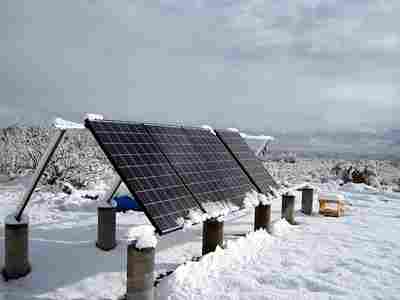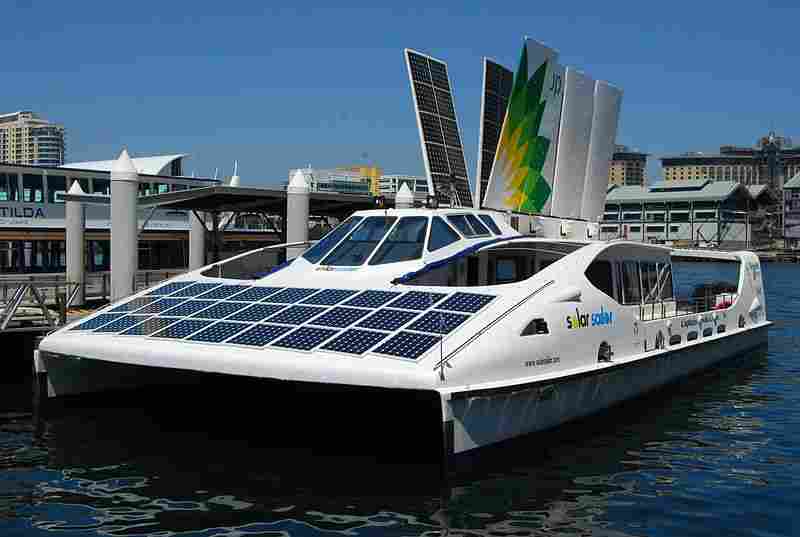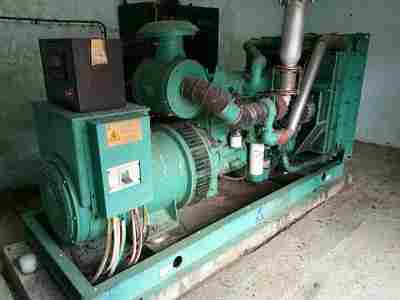9 Solar Panel Benefits Discussed
Solar panel benefits include affordability, long-term cost savings, property value increase, usability in various locations and climates; pollution-free operation, simplicity of design and installation, reduction of grid dependence, low maintenance requirements, flexible energy storage and backup.
This article discusses solar panel benefits, as follows;
1). Affordability (as one of the Solar Panel Benefits)
Solar panels offer an important benefit: affordability. They are a cost-effective way to generate electricity and offer numerous advantages in terms of savings and value. This section discusses how solar panels are beneficial in the area of affordability.
Aspects of the Affordability of Solar Panels
The affordability of solar panels can be traced to factors like its operating costs, energy bill savings, return on investment (ROI), government incentives, and long-term value.
Once installed, solar panels have relatively low operating costs. They require minimal maintenance, mainly cleaning to ensure they perform efficiently. This means you can enjoy electricity generation without substantial ongoing expenses.
Solar panels can significantly reduce your monthly energy bills. By generating your electricity, you'll rely less on electricity from the grid, which can lead to substantial savings over time. The exact amount of savings depends on factors like your location, energy usage, and the size of your solar panel system.
Solar panels can also offer a strong ROI. While there is an initial upfront cost for purchasing and installing solar panels, many homeowners and businesses find that they recoup this investment over time through energy savings. In some cases, you may even generate excess electricity that you can sell back to the grid, further enhancing your ROI.
Government Incentives: In many countries, governments offer incentives, tax credits, and rebates to encourage solar panel adoption. These incentives can significantly reduce the overall cost of installing solar panels, making them even more affordable.
Solar panels typically come with warranties of 25 years or more. This means they continue generating electricity and providing value long after they've paid for themselves. In essence, solar panels are a long-term investment in affordable, sustainable energy.
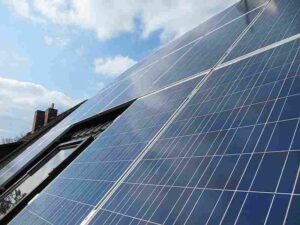
Additional Notes on Solar Panel Affordability
The cost of solar panels can vary widely depending on factors like panel type, size, and installation costs. On average, solar panel installation and the entire system can range from $15,000 to $25,000 or more. However, prices may be lower with incentives and based on your specific needs.
Solar panels have become more affordable over the years due to advances in technology and manufacturing. New manufacturing techniques have made panel production more efficient, requiring fewer resources. Additionally, increased competition in the solar industry has driven prices down, making solar panels more accessible to consumers.
2). Long-Term Cost Savings from Using Solar Panels
In the same vein as their affordability, solar panels provide an essential benefit in the form of long-term cost savings. They can help you save a significant amount of money over the life of the system. Here, it is shown how solar panels are advantageous in this area.
How Solar Panels Help Users Achieve Long-Term Cost Savings
Reduced energy bills, long term ROI, protection against rising energy costs, and environmental benefits all indicate the cost-saving potential of solar panels.
Solar panels generate electricity from sunlight, reducing your reliance on electricity from the grid. This means you'll purchase less electricity from your utility company, resulting in lower energy bills each month.
While there's an initial cost to purchase and install solar panels, many homeowners and businesses find that they recoup this investment over time. In some cases, you may even generate excess electricity, which can be sold back to the grid, further enhancing your savings.
As mentioned earlier, solar panels typically come with warranties of 25 years or more. This means they continue generating electricity and providing savings long after they've paid for themselves. Solar panels are a long-term investment in affordable, sustainable energy.
Over time, energy costs tend to rise. Solar panels can act as a shield against these rising costs. By generating your electricity, you're less affected by increases in utility rates, ensuring more consistent and predictable energy expenses.
Lastly, in addition to financial savings, solar panels contribute to environmental benefits. They reduce greenhouse gas emissions and dependence on fossil fuels, promoting a cleaner and more sustainable energy future.
Addition Notes on the Ability of Solar Panels to Save Costs in the Long-Term
The savings from a 5kW solar system can vary depending on factors such as your location, energy consumption, and the cost of electricity. As a general rule, a solar system can save you up to around $400 per year per kW. So, a 5kW system could save you approximately $2,000 per year on your electricity bills.
Please note that these figures are estimates, and your actual savings may differ based on your specific circumstances.
Solar panels are not only a cost-effective way to generate electricity but also provide numerous financial benefits over the long term.
3). Increase in Property Value (as one of the Solar Panel Benefits)
Solar panels can significantly increase the value of your property. This section explains how solar panels benefit your property value.
Ways in which Solar Panel Increase the Value of Homes
Solar panels increase the value of homes through their energy efficiency that leads to annual energy savings, as well as through enhanced appeal, higher listing price, and tax benefits.
In general, solar panels make your home more energy-efficient. They generate clean and renewable energy, reducing your reliance on traditional energy sources. This increased efficiency is attractive to potential buyers because it means lower energy bills.
Solar panels lead to annual energy savings, which can be a strong selling point for your property. Buyers are often willing to pay more for a home that offers long-term savings on energy expenses.
A solar system adds to your home's curb appeal and overall attractiveness. It showcases your commitment to sustainability and environmentally friendly living, which can make your property stand out in the market.
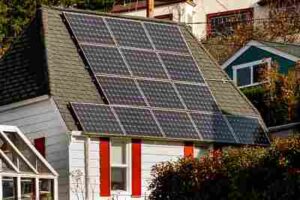
As a result, homes with solar panels typically command a higher listing price. Buyers perceive solar-equipped homes as valuable investments due to the reduced operating costs associated with solar energy.
Lastly, in some areas, properties with solar panels may qualify for tax incentives or rebates, which further increase the property's value.
Addition Notes on the Home Requirement of Solar Panels
The number of solar panels needed to power a house depends on various factors, including the location, energy consumption, and the efficiency of the panels. On average, for an American home of around 2,480 square feet, it may require 15 to 22 full-sized solar panels to replace traditional energy sources completely.
However, this can vary, so it's best to consult with a solar installation professional to determine the specific requirements for your home.
4). Usability in Various Locations and Climates
Solar panels offer great usability in various locations and climates. Here it is shown how solar panels are beneficial in this regard.
Aspects and Benefits of the Versatile Use of Solar Panels
The geographically versatile utilization of solar panels shows their adaptability and efficiency under various conditions, as well as their potential as instruments for mitigating climate change.
Solar panels are versatile and can be installed in different geographic locations and climates. They are designed to withstand a wide range of weather conditions, from extreme heat to freezing cold.
Contrary to some opinions on their operation under various conditions, solar panels actually work efficiently in cold climates. Solar panels generate electricity by absorbing sunlight, not heat, so even in below-freezing temperatures, they can convert sunlight into electricity effectively.
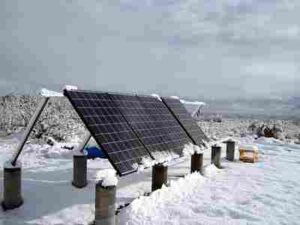
While solar energy is not evenly distributed across the Earth, solar panels can function in various regions. The intensity of solar radiation depends on the angle of impact, making flat solar panels suitable for equatorial regions where the sun is high in the sky, and angled panels more productive in locations farther from the equator.
Solar energy plays a crucial role in mitigating climate change. By harnessing solar power, we reduce our dependence on fossil fuels, which are a major contributor to global warming. Solar energy is a clean and sustainable alternative that helps reduce greenhouse gas emissions.
The choice of location for a solar power project depends on multiple factors, including latitude, climate, and geographic features. Solar panels can be effectively utilized in areas with low cloud coverage and abundant sunlight.
Lastly, as stated earlier, solar panels can thrive in various weather conditions, including snowy areas. Research has shown that they can still generate electricity successfully even in harsh winter environments.
Additional Notes on the Use of Solar Panels in Various Locations and Climates
Solar panels can be used in various climates. However, areas with low cloud coverage and abundant sunlight are typically best suited for solar panel energy use. Solar panels are adaptable and can work effectively in both hot and cold climates.
The effectiveness of solar panels can vary based on their geographic location. Solar panels tend to be more effective in regions with high solar radiation, which is influenced by factors like latitude, climate, and terrain. Equatorial regions often receive more direct sunlight and, therefore, can be particularly suitable for solar panel installations.
Solar panels play a crucial role in mitigating climate change by reducing the reliance on fossil fuels for electricity generation. Solar energy is clean, renewable, and produces no greenhouse gas emissions when generating electricity, making it a key contributor to reducing carbon emissions and addressing climate change.
Solar panels work best in geographic locations with abundant sunlight and low cloud coverage. Equatorial regions and areas with high solar radiation are particularly well-suited for solar panel installations. However, solar panels can be effectively utilized in a wide range of locations and climates around the world.
5). Pollution-Free Usage (as one of the Solar Panel Benefits)
Solar panels offer pollution-free usage, making them an environmentally friendly source of energy. This section discusses how solar panels are beneficial in the area of mitigating environmental pollution.
Ways in Which Solar Panels Mitigate Energy-Related Pollution
Solar panels mitigate energy-related pollution through zero emissions, reduced carbon footprint, improvement of local air quality; reduction of noise pollution, safe disposal, and reduced fossil fuel dependence.
It is well-known that solar panels do not produce emissions or pollutants when generating electricity. Unlike fossil fuels, which release greenhouse gases and pollutants into the atmosphere when burned for energy, solar panels harness energy from sunlight without emitting harmful substances.
While solar panel production and transportation have associated emissions, the electricity generated by solar panels during their operational lifespan more than offsets these emissions. Solar panels help reduce overall carbon emissions, contributing to a cleaner environment.
Solar energy technologies and power plants do not produce air pollution during their operation. This means that the air remains clean and free from pollutants like sulfur dioxide, nitrogen oxides, and particulate matter often associated with conventional power generation.
Solar panel systems operate silently as they have no moving parts. Unlike some other forms of power generation, such as combustion engines or industrial machinery, solar panels do not contribute to noise pollution.
While solar cells may contain hazardous materials like lead and arsenic, proper disposal procedures are in place to manage these materials when solar panels reach the end of their lifespan. This ensures that the hazardous substances do not harm the environment.
By harnessing energy from the sun, solar power reduces dependence on fossil fuels, which are a major source of pollution and greenhouse gas emissions.
Additional Notes on Pollution-Free Operation of Solar Panels
Solar panels themselves do not emit emissions while generating electricity. However, emissions can occur during the production and transportation of materials used in solar panel manufacturing. Nevertheless, the emissions from solar panels' operational lifetime are significantly lower compared to the emissions from fossil fuel-based energy sources.
Solar panels can reduce pollution significantly by generating clean electricity without emitting greenhouse gases or air pollutants. The amount of pollution reduction depends on the scale of solar panel installations. For example, utility-scale solar power can save hundreds of metric tons of carbon dioxide emissions per year.
Generally, solar power is free of noise pollution. Solar panels have no moving parts, and their operation is silent. They do not produce any noise pollution during electricity generation, making them suitable for residential areas and environmentally sensitive locations.
6). Simplicity of Design and Installation
Solar panels are known for their simplicity of design and ease of installation. This section provides further insight into such benefits of solar panels.
Aspects of the Simplicity of Solar Panel Design and Installation
The simplicity associated with solar panels can be measured in terms of their straightforward installation process, DIY-friendly options, customizable design, and grid connections.
Installation of solar panels typically involves a straightforward step-by-step process. This process includes mounting the panels, connecting electrical wiring, installing inverters, and making the necessary electrical connections. These steps are well-defined and can be carried out by trained professionals.
Some solar panel systems are designed to be DIY-friendly, allowing homeowners with basic knowledge of electrical systems to install them. This approach can save on installation costs and make solar panels more accessible to a broader range of users.
Solar panel systems can be customized to suit the specific needs and available space of a property. This flexibility in design ensures that solar panels can be installed on a wide range of building types, including residential homes, commercial buildings, and industrial facilities.
Designing a solar panel system involves determining the power consumption demands of a property and sizing the PV modules accordingly. This process considers factors such as available roof space, solar radiation data, shading issues, and inverter sizing to optimize the system's performance.
Grid-connected solar panel systems, which are the most common type, are particularly simple to install. These systems seamlessly integrate with the existing electrical grid, allowing excess electricity to be fed back into the grid or drawn from it as needed. This grid connection eliminates the need for complex energy storage solutions.
The simplicity of solar panel installation can lead to cost savings for homeowners and businesses. Reduced installation complexity means less time and labor required, resulting in lower installation costs.
Additional Notes on the Simplicity of Solar Panel Design and Installation
The installation process for solar panels typically involves steps like mounting the panels, wiring, connecting inverters, and making electrical connections. It can be carried out by professionals or, in some cases, by homeowners as a DIY project.
The number of solar panels needed for a system depends on factors like hourly energy requirements, peak sunlight hours, and panel wattage. You can calculate it by multiplying energy requirements by peak sunlight hours and dividing by a panel's wattage.
Some solar panel systems are designed to be DIY-friendly, allowing homeowners with basic electrical knowledge to install them. However, professional installation is recommended for larger or more complex systems.
Grid-connected solar panel systems are simpler to install than alternative renewable energy solutions, because they seamlessly integrate with the existing electrical grid. They can feed excess electricity into the grid or draw from it as needed, eliminating the need for complex energy storage solutions and making installation more straightforward.
7). Reduction of Grid Dependence (as one of the Solar Panel Benefits)
Solar panels also offer the benefit of reducing dependence on the electrical grid. Here, it is shown how solar panels are beneficial in this area.
How Solar Panels Reduce Reliance on the Grid
Solar panels reduce grid dependence by enhancing energy self-sufficiency, establishing grid-tied backup systems, reducing energy bills, and creating avenue for net-metering programs.
Solar panels enable homeowners and businesses to generate their own electricity from sunlight. By harnessing solar energy, you can meet a portion or even the entirety of your electricity needs without relying solely on the grid.
Most solar panel installations are grid-tied systems, meaning they are connected to the electrical grid. During periods when your solar panels produce excess energy, it is fed back into the grid. Conversely, when your panels aren't producing enough electricity, you can draw power from the grid. This bidirectional flow of energy allows for flexibility and reliability.
Solar panels can significantly reduce your electricity bills, as you generate your own energy during sunny days. This can lead to cost savings over time and decrease your reliance on the grid for electricity supply.
Many regions offer net metering programs. If your solar system generates more electricity than you use, the excess energy is sent back to the grid. In return, you may receive credits or compensation from your utility company. Net metering further encourages grid independence.
Additional Notes on Solar Panels and Grid Reliance
We reduce reliance on the grid by; investing in solar power systems to generate electricity, implementing energy-efficient practices and appliances, and exploring energy storage solutions like batteries to store excess energy for later use.
Solar cells reduce dependency on the electrical grid for the supply of electricity.
When solar panels produce more energy than you are using off-grid, the excess energy is typically sent back to the grid. Depending on your region and utility company, you may receive credits or compensation for the surplus electricity you contribute to the grid. This process is often facilitated through net metering programs.
8). Low Maintenance Requirements
Solar panels come with the benefit of requiring very little maintenance. This advantage of solar panels is further discussed in the subsection below.
Aspects and Facilitators of the Low Maintenance Needs of Solar Panels
The low maintenance needs of solar panels can be attributed to factors like the absence of moving parts, minimal cleaning requirement, longevity, few points of potential failure, and simplicity of design.
Solar panels have no moving parts, which means there is less wear and tear compared to traditional energy systems like generators or engines. This absence of moving parts significantly reduces the need for maintenance.
The primary maintenance task for solar panels is periodic cleaning to remove dust, dirt, leaves, and other debris that might accumulate on the surface. Rain can also assist in cleaning panels to some extent.
Solar panels are designed to be durable and can last for 25 to 30 years or more. They are typically made of tempered glass and anodized aluminum, which are resistant to corrosion and degradation.
There are few critical points of failure in solar panels, due to their simple design. This means there are fewer components that can break or malfunction.
Routine inspections, typically a few times a year, can help identify any issues such as micro-cracks or hot spots. These can be addressed promptly to ensure optimal performance.
Additional Notes on the Maintenance Requirements of Solar Panels
Solar panels require very little maintenance primarily because they have no moving parts that can wear out, and their design is simple and durable. Routine cleaning to remove debris is the most common maintenance task.
Maintaining solar panel efficiency involves keeping them clean and free from obstructions like shading. Regular inspections can help identify any issues that may affect efficiency.
Common failures in solar panels may include micro-cracks, hot spots, delamination, shattering, or discoloration. Regular inspections can help detect these issues early for timely repair or replacement.
It is generally recommended to give solar panels a thorough cleaning at least once a year. However, the frequency may vary based on your location and the level of debris accumulation. In some cases, rain may provide sufficient cleaning.
9). Flexible Energy Storage and Backup (as one of the Solar Panel Benefits)
Solar panels offer the advantage of flexible energy storage and backup capabilities, providing reliable power even when the sun isn't shining. In the following subsection, more light is shed on how solar panels are beneficial in this area.
Flexibility and Advantage of Energy Storage with Solar Panels
Through energy storage, solar panels provide protection against power outages, foster energy independence, and offer both load-shifting options and environmental benefits.
Solar panels generate electricity when the sun is shining. With the addition of solar batteries, excess energy generated during the day can be stored for later use, such as during the night or on cloudy days. This stored energy acts as a backup power source.
When coupled with energy storage solutions like batteries, solar panel systems can provide backup power during grid outages. This ensures that essential appliances and lights in your home continue to function, enhancing your resilience during emergencies.

By storing excess energy from your solar panels, you reduce your reliance on the grid, especially during peak-demand periods. This can lead to significant cost savings and reduced exposure to fluctuating electricity prices.
Solar batteries enable you to shift your energy usage to times when electricity is cheaper or more readily available. You can charge your batteries during off-peak hours and use that stored energy during peak-demand times, effectively reducing your electricity costs.
Using stored solar energy during non-sunny hours reduces the need to rely on fossil fuel-based backup generators, which produce greenhouse gas emissions. Solar energy systems with batteries contribute to a cleaner and more sustainable energy future.
Clarifying the Potential and Duration of Solar Panel Energy Storage
Solar panels themselves do not store energy. Energy storage is achieved through the use of solar batteries.
The duration for which a solar battery can store energy varies depending on its capacity and the amount of energy it needs to supply. Typically, a standard solar battery can hold a charge for 1-5 days. However, larger battery systems can store more energy for extended periods, making them suitable for longer backup durations during power outages.
Conclusion
Solar panel benefits are;
1. Affordability
2. Long-Term Cost Savings
3. Property Value Increase
4. Usability in Various Locations and Climates
5. Pollution-Free Usage
6. Simplicity of Design and Installation
7. Reduction of Grid Dependence
8. Low Maintenance Requirements
9. Flexible Energy Storage and Backup
